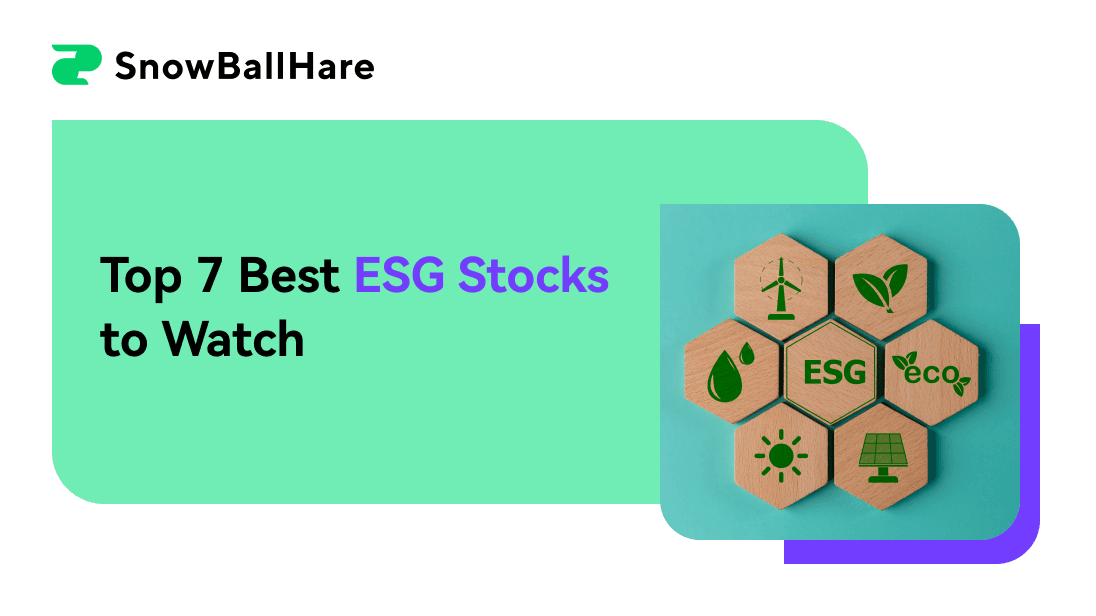● ESG stocks are characterized by consistent returns, as they often outperform traditional investments during market downturns; for instance, ESG funds outperformed non-ESG funds 62% of the time in recent volatility studies.
● ESG stocks also tend to exhibit lower volatility, partly due to strong governance practices and risk management, which stabilize performance amid economic shifts.
● Lastly, high liquidity is typical among ESG stocks, with a growing number of ETFs and mutual funds incorporating them; the ESG fund market surpassed $2 trillion in 2023, enhancing accessibility and liquidity for investors.

Source: pixel4k.com
I. What Are ESG Stocks
ESG stands for Environmental, Social, and Governance, three critical factors used to evaluate companies based on their ethical impact and sustainability practices. ESG stocks, therefore, are shares in companies that prioritize these three pillars in their operations, decision-making, and disclosures. Environmental criteria consider how a company addresses issues like carbon emissions, waste management, and energy efficiency. Social criteria focus on areas such as labor practices, community engagement, and diversity. Governance assesses transparency, executive compensation, and board diversity. ESG investing, or sustainable investing, involves selecting investments that meet these criteria, intending to achieve both financial returns and positive social impact.
Why Invest in ESG Stocks?
ESG stocks are increasingly popular due to their potential to provide strong returns, reduced risks, environmental benefits, social responsibility, and long-term viability.
● Strong Returns: ESG-focused funds and stocks have shown promising returns. According to a study by Morgan Stanley, ESG stocks outperformed non-ESG stocks 62% of the time during the COVID-19 downturn. The MSCI KLD 400 Social Index, for example, which tracks U.S. companies with high ESG ratings, has outperformed the S&P 500 consistently over the last five years, delivering an annualized return of around 12.1% versus the S&P’s 10.5%.
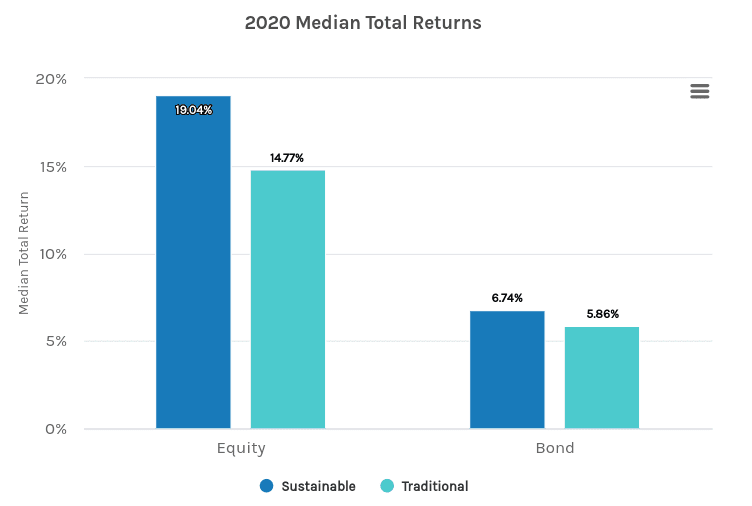
Source: morganstanley.com
● Risk Management: Companies with strong ESG practices often have better risk management, as they tend to avoid scandals and regulatory issues. For instance, in 2019, ESG-aligned companies reported fewer regulatory penalties than their peers, reducing potential financial losses and reputational damage.
● Environmental Benefits: ESG stocks support companies striving to mitigate climate change by lowering their carbon footprint. Tesla, for example, its supercharger network (the world’s largest fast-charging network was 100% renewable in 2023.
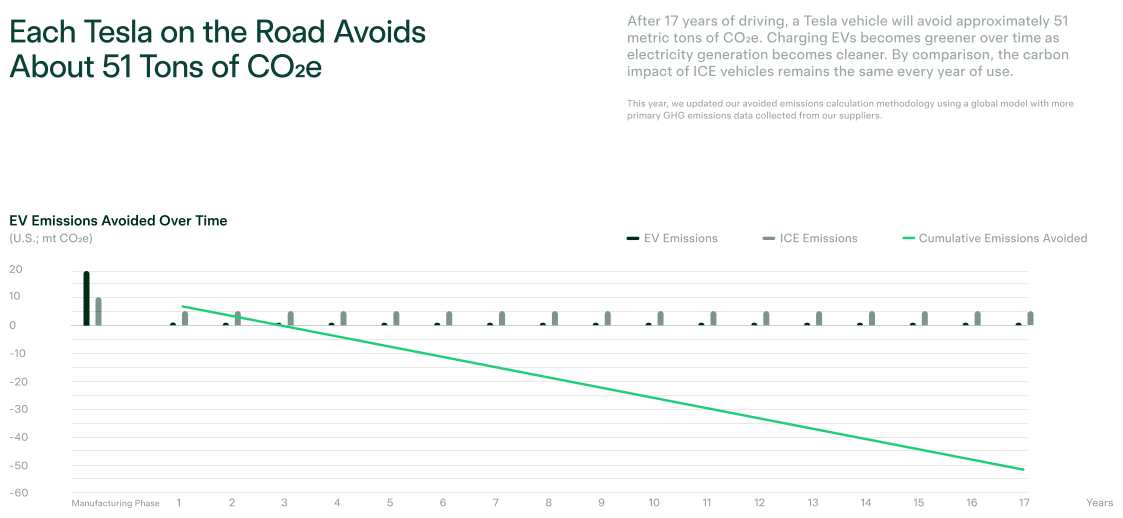
Source: 2023-Tesla-Impact-Report
● Social Responsibility: ESG investing allows investors to support companies that align with their social values, such as fair labor practices. For instance, Unilever has committed to paying living wages across its global supply chain by 2030.
● Long-Term Viability: Companies prioritizing ESG tend to be forward-looking, adapting to societal and regulatory shifts, making them potentially more resilient investments in the long term.
II. Best Stocks for ESG Investing
Microsoft Corp. (MSFT)
Microsoft dominates the software industry with its Office 365 suite and Azure cloud platform, the latter of which holds 23% of the cloud market share, second only to Amazon Web Services (AWS).
Investment Case:
Microsoft’s aggressive sustainability goals, like achieving carbon negativity by 2030, elevate its ESG appeal. It also intends to remove all carbon it has emitted since its founding by 2050. The company achieved $245 billion in revenue in fiscal 2024, marking a 16% increase from 2023. Microsoft has an “AAA” MSCI ESG rating, underscoring its commitment to environmental responsibility, data security, and diversity in leadership.
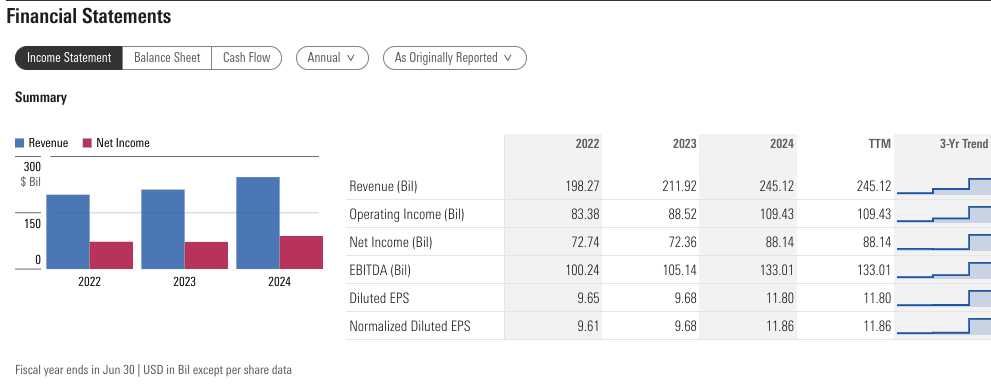
Source: morningstar.com
Future Growth Potential:
Azure’s cloud revenue growth, averaging 30% annually, alongside investments in AI, makes Microsoft a solid ESG choice with strong financial prospects.
NVIDIA Corp. (NVDA)
As the global leader in graphics processing units (GPUs), NVIDIA holds a 90% market share in GPUs, critical for gaming, data centers, and AI applications.
Investment Case:
NVIDIA commits to reducing emissions across its entire supply chain, recently achieving a level of using 76% renewable electricity in FY24. With fiscal 2024 revenues of $61 billion, up 126% year-over-year, NVIDIA benefits from robust demand in AI and data centers. MSCI rates NVIDIA “AA” on ESG due to its commitment to responsible sourcing and energy-efficient product designs.
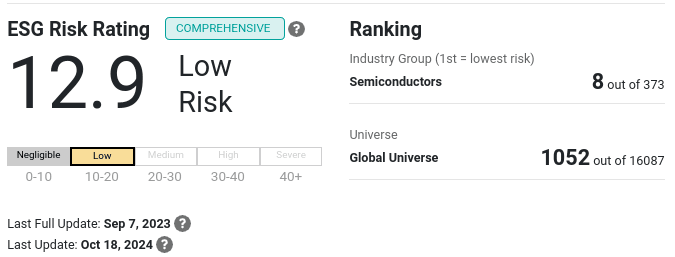
Source: sustainalytics.com
Future Growth Potential:
The global AI market, projected to reach $827 billion by 2030, offers NVIDIA a massive growth runway, amplifying its ESG-driven initiatives in sustainable computing.
Best Buy Co., Inc. (BBY)
Best Buy, a leading electronics retailer in North America, controls over 15% of the U.S. consumer electronics market.
Investment Case:
Best Buy focuses on responsible electronics recycling, with over 2 billion pounds of e-waste recycled since 2009. Its ESG initiatives include committing to net-zero emissions by 2040. In fiscal 2024, the company posted $43.5 billion in revenue, albeit with a slight decrease from 2023. Best Buy has a “BBB” MSCI ESG rating, with strengths in product sustainability and supply chain transparency.
Future Growth Potential:
Best Buy’s expanding e-commerce and service offerings, including in-home technology support, position it for steady growth, while its ESG efforts appeal to environmentally conscious consumers.
Adobe Inc. (ADBE)
Adobe leads the digital media and marketing industry, with Creative Cloud commanding a 60% share of the digital content creation market.
Investment Case:
Adobe is carbon-neutral and committed to 100% renewable energy in its global operations. It saw $19.4 billion in revenue in 2023, a 10% year-over-year increase. Adobe’s “AAA” MSCI ESG rating reflects its commitment to sustainable operations, data privacy, and workforce diversity.
Future Growth Potential:
Adobe’s investment in AI-powered creative tools and expanding digital experiences segment makes it a promising ESG stock with ongoing growth opportunities in digital transformation.
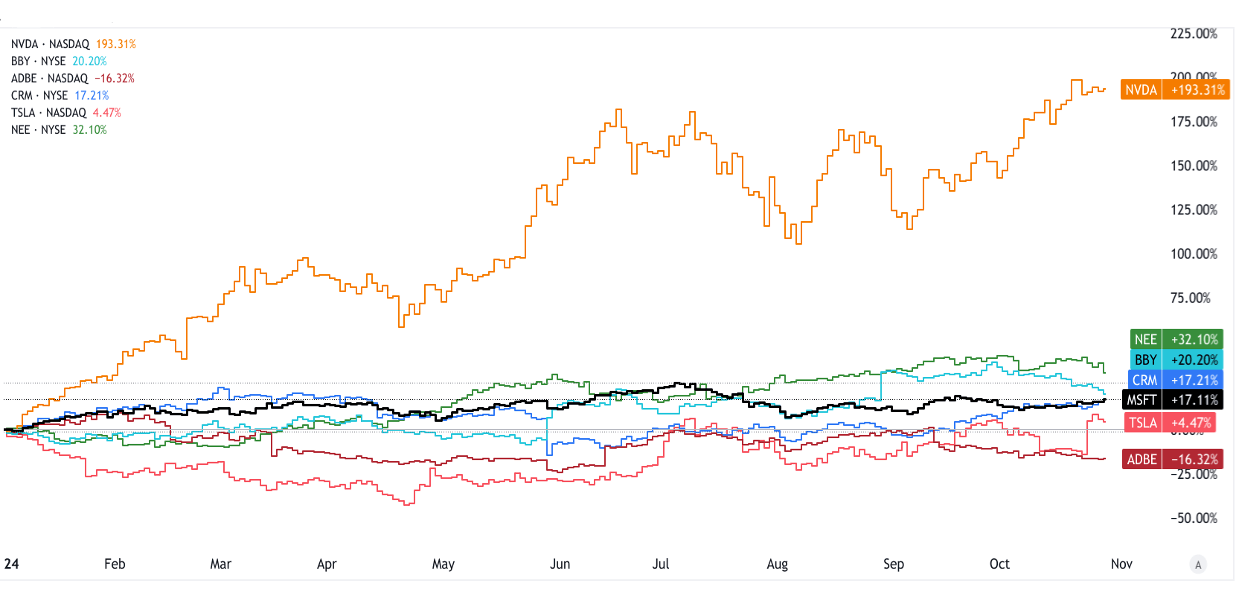
Source:tradingview.com [YTD_Price_Return]
Salesforce Inc. (CRM)
Salesforce is a leader in customer relationship management (CRM), with a 19.8% market share in CRM solutions.
Investment Case:
Salesforce is committed to net-zero emissions across its supply chain by 2050 and emphasizes environmental advocacy. In fiscal 2024, Salesforce achieved $34.9 billion in revenue, a 11% rise year-over-year. Its “AA” MSCI ESG rating reflects strong governance and environmental transparency.
Future Growth Potential:
With a projected global CRM market growth of 14% annually, Salesforce’s cloud-based CRM solutions and AI-driven insights reinforce its ESG impact and revenue growth potential.
Tesla, Inc. (TSLA)
Tesla is a pioneering electric vehicle (EV) manufacturer, holding a ~50% market share in the U.S. EV market.
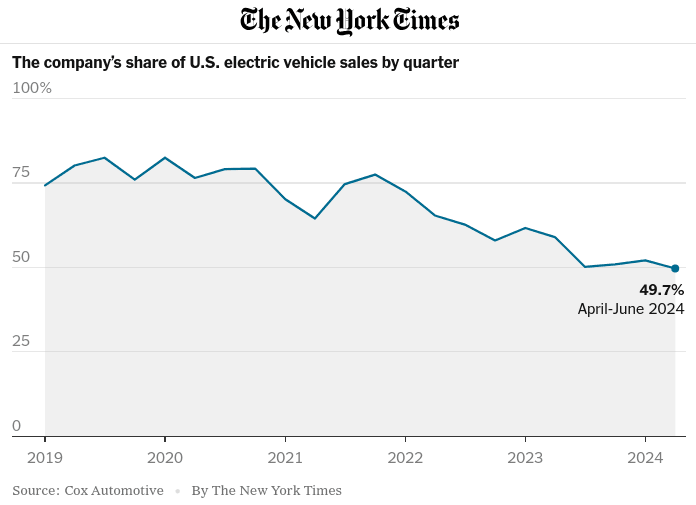
Source: nytimes.com
Investment Case:
Tesla’s core business aligns with global goals to reduce emissions, and it aims for a 20 million vehicle annual production by 2030. In 2023, Tesla reported revenues of $96.7 billion, a 19% increase over 2022. Despite challenges, Tesla is recognized for high environmental impact, although its MSCI ESG rating dropped to “BBB” in 2023 due to governance concerns.
Future Growth Potential:
With EV adoption accelerating worldwide, Tesla’s focus on renewable energy and battery technology places it as a high-growth ESG candidate.
NextEra Energy, Inc. (NEE)
NextEra Energy, a leading clean energy company, dominates the U.S. renewable energy sector with substantial wind and solar capacity.
Investment Case:
Committed to 100% carbon neutrality by 2045, NextEra reported $28.1 billion in revenue in 2023, up 34% from 2022. Its “AAA” MSCI ESG rating reflects strengths in environmental stewardship and renewable energy leadership.
Future Growth Potential:
With renewables projected to account for 38% of U.S. power generation by 2030, NextEra’s expansion in solar and wind power aligns with long-term growth in clean energy.
ESG Funds & ESG ETFs
Vanguard FTSE Social Index Fund (VFTAX)
VFTAX is an ESG mutual fund tracking the FTSE4Good U.S. Select Index, which excludes companies with poor ESG practices. VFTAX holds diversified large-cap stocks, including Microsoft and NVIDIA, offering an annual return of ~12.5% over the past decade.
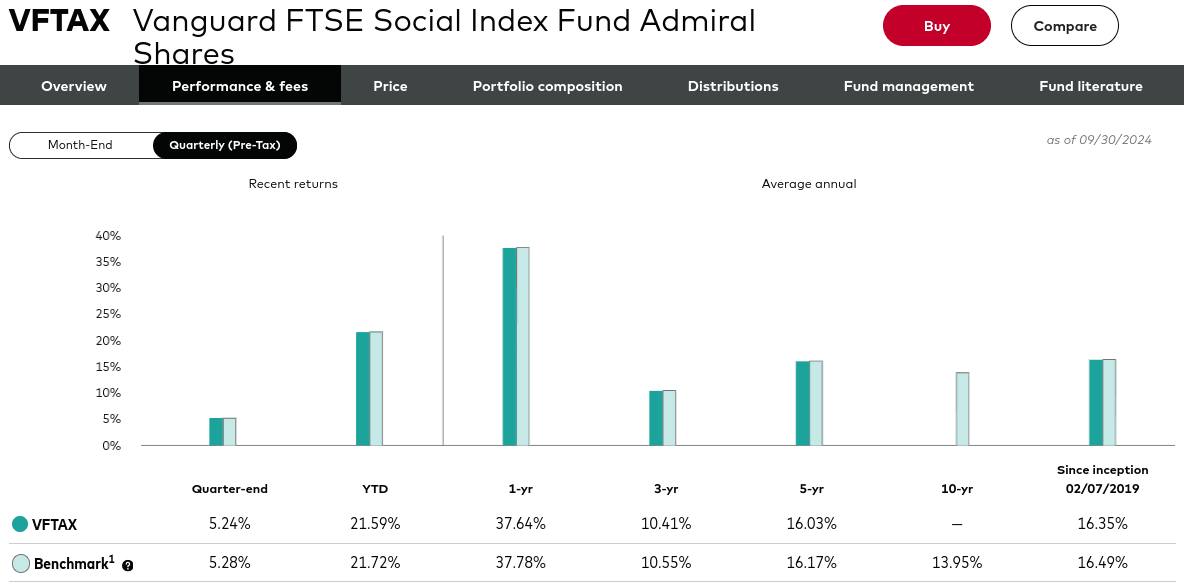
Source: investor.vanguard.com
Vanguard ESG U.S. Stock ETF (ESGV)
ESGV focuses on U.S.-based large- and mid-cap stocks with strong ESG scores, omitting industries like fossil fuels and nuclear energy. ESGV holds assets such as Microsoft, Tesla, and Adobe, aiming for long-term capital appreciation with minimal environmental and social risks.
iShares MSCI Global Impact ETF (SDG)
SDG targets companies with significant exposure to the United Nations Sustainable Development Goals (SDGs), like NextEra Energy. SDG aims to align financial returns with positive global impact by investing in healthcare, clean energy, and technology sectors.
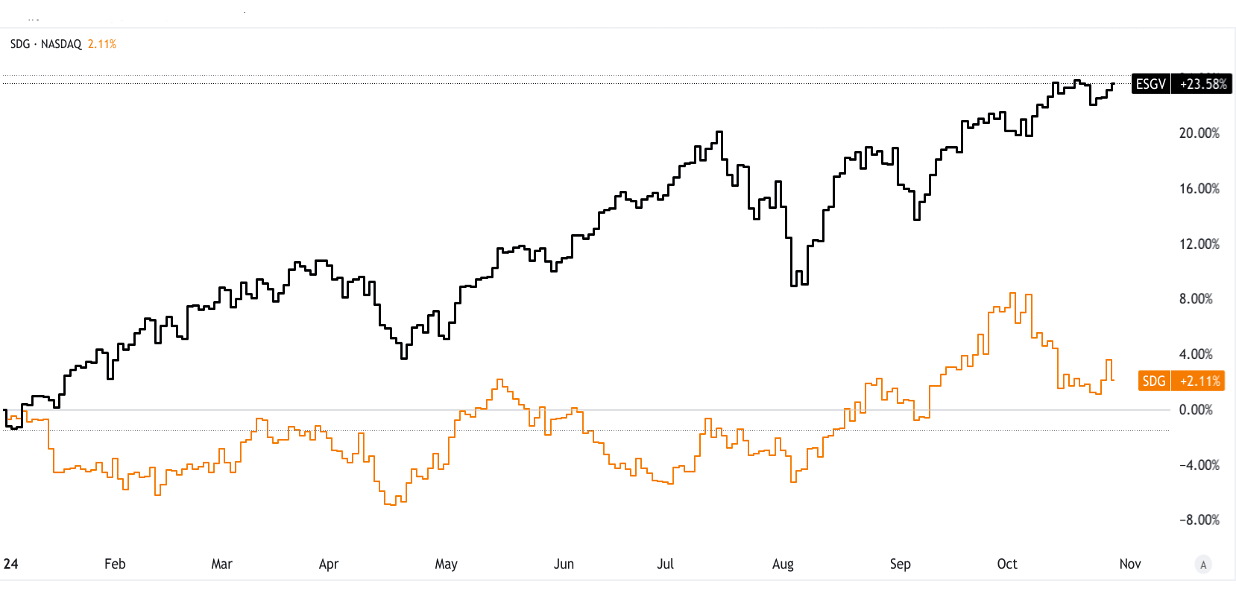
Source:tradingview.com [YTD_Price_Return]
Parnassus Core Equity Fund (PRBLX)
PRBLX invests in high-ESG-rated companies and avoids sectors like tobacco and weapons. With a consistent annual return of around 10% over ten years, PRBLX includes holdings like Adobe and Salesforce, reinforcing both ethical investing and financial growth.
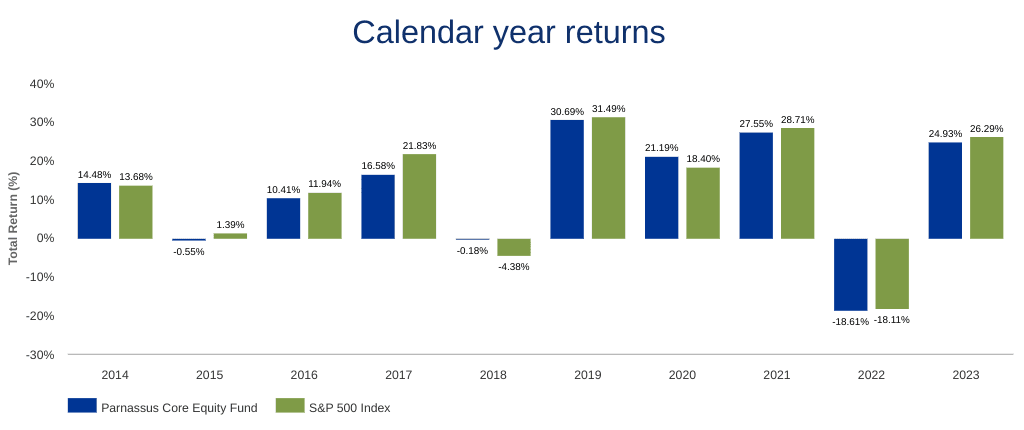
Source: parnassus.com
III. Factors to Consider When Investing in ESG Stocks
When selecting ESG stocks, evaluating ESG Ratings and Scores is crucial. These scores, provided by agencies like MSCI, Sustainalytics, and Refinitiv, offer insights into a company’s environmental, social, and governance performance. For example, MSCI’s ratings range from “AAA” for leaders to “CCC” for laggards, assessing factors like emissions, product safety, and governance practices. Comparing scores across agencies helps identify discrepancies and gives a broader view of a company’s ESG standing.

Source: msci.com
Financial Performance is equally vital. ESG-focused companies often innovate in areas like clean energy or resource efficiency, positioning themselves well for growth. ESG stocks outperform non-ESG stocks during market downturns, suggesting that ESG practices can contribute to financial resilience.
Reviewing Company Practices and Policies is another key step. Companies with strong ESG policies often comply with or exceed regulations, reducing risks related to legal issues and fines. For instance, a company committed to net-zero emissions aligns with growing climate regulations, lowering potential compliance costs.
However, Challenges like Greenwashing complicate ESG investing. Some companies may exaggerate their ESG initiatives, creating credibility issues around their claims. This can be particularly difficult to verify in sectors with limited transparency. For instance, in 2022, 36% of funds labeled "ESG" in Europe were found to lack genuine ESG credentials, underscoring the importance of due diligence.
IV. ESG Investing Trends and ESG Investing Stocks Outlook
The ESG investing market is experiencing rapid growth, driven by heightened demand for sustainable finance and increased regulatory support. As of 2023, global ESG assets reached approximately $40 trillion and are projected to surpass $50 trillion by 2025. Regionally, Europe leads with over 50% of ESG assets under management, though North America is gaining momentum, accounting for roughly 25% of ESG funds. In Asia, ESG investments are expanding due to regulatory incentives, particularly in Japan and South Korea, which are emphasizing sustainable finance initiatives.
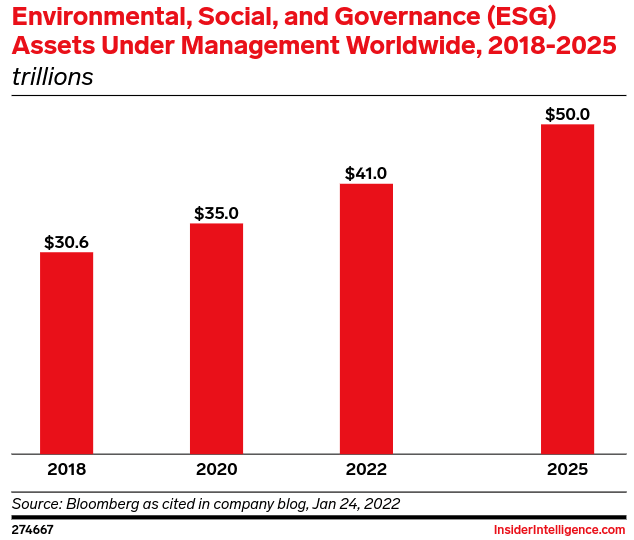
Source: emarketer.com
Key trends driving this growth include the Voluntary Carbon Market, projected to exceed $50 billion by 2030 as companies invest in carbon offset initiatives to meet net-zero commitments. Meanwhile, the Integration of AI and Technology in ESG Reporting is enhancing transparency and enabling more accurate, real-time ESG assessments. Advanced analytics are helping companies streamline disclosures on emissions, social impacts, and governance standards, fostering credibility among investors.
Sustainable Finance and Impact Investing also play a pivotal role, with green bonds and ESG-focused mutual funds and ETFs expected to grow. In 2024 alone, green bond issuance (GSSSB issuance) may increase to $1.05 trillion in 2024, from 2023’s level of $0.98 trillion, demonstrating a shift toward sustainable project financing.
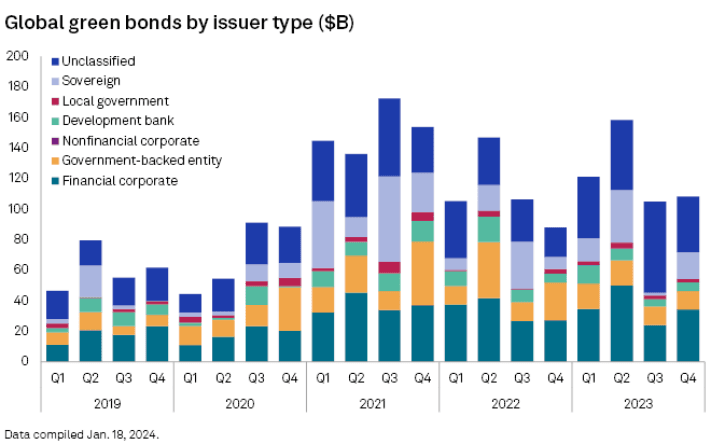
Source:capitaliq.spglobal.com
Looking forward, the long-term outlook for ESG stocks appears robust, with sector-specific opportunities emerging across industries:
● Technology: Companies like Microsoft (MSFT) and Adobe (ADBE) are well-positioned due to their innovations in sustainable cloud solutions and AI, which are projected to grow alongside digital transformation.
● Energy: NextEra Energy (NEE) is poised for gains as renewable energy demand surges, supported by tax incentives and increasing regulatory targets for clean energy.
● Automotive: Tesla (TSLA) is set to benefit from the growing EV market, expected to expand 30% annually, driven by emission reduction goals.
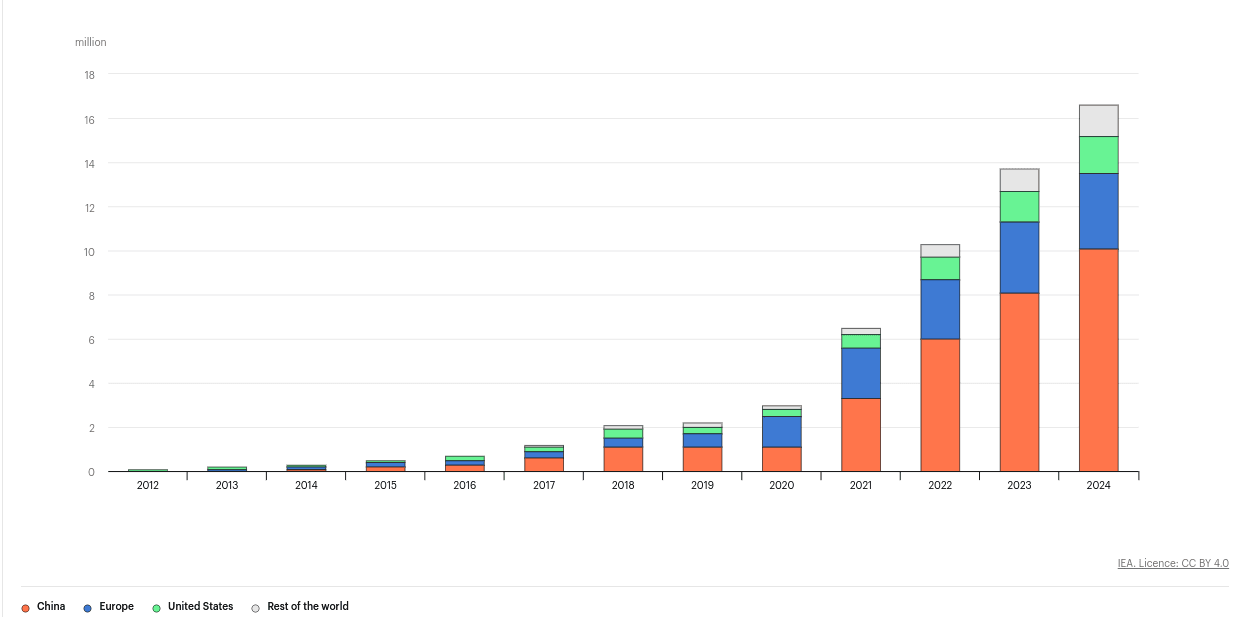
Source: iea.org [Electric car sales, 2012-2024]
The increasing demand for ESG investment products—mutual funds, ETFs, and green bonds—reflects a shift in investor preference, with surveys showing that 80% of millennials prioritize sustainable investing. Additionally, regulatory support in the form of climate-related disclosure requirements in the U.S. and Europe will boost transparency, further attracting ESG-conscious investors.
*Disclaimer: The content of this article is for learning purposes only and does not represent the official position of SnowBallHare, nor can it be used as investment advice.
